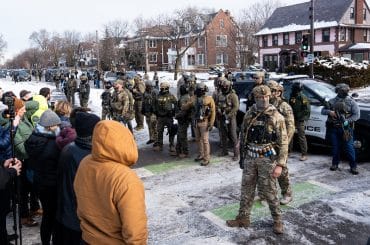On May 16, as Columbia University’s Spring semester ended, the school newspaper published an Op-Ed from the “Task Force on Anti-Semitism” appointed by President Minouche Shafik last November. The Task Force, made up of pro-Israel faculty, announced at its inception its goal of making “ambitious changes” to the University’s “policies, rules, and practices,” and has already released one report supporting increased restrictions on student protests. While it has made a point of refusing to define what it means by “antisemitism,” its latest communication indicates that Columbia faculty and students critical of Israel and Zionism may well be in real danger should the Task Force deliver on its currently-stated goals. School of the Arts professor James Schamus responds to their latest provocation here.
Dear Members of the Columbia University “Task Force on Antisemitism,”
Your end-of-semester Op-Ed in the Columbia Spectator, entitled “We Hear You,” clarified a lot of questions about where you’re coming from and what you are setting out to accomplish. So I just want to start by saying: You may hear us, but we see you. And what we see is, to be honest, downright scary.
A lot has happened since the Task Force was formed back in November, and perhaps some of you are wondering just how much more you got than you signed up for; one can imagine that back in those early days of your already hazily-defined mission, the idea that Columbia and Barnard students would help ignite a worldwide protest movement against an ongoing mass slaughter was not really on your or anyone else’s bingo cards. I mean, one might have thought Netanyahu and co. would perhaps “mow the lawn” with a thousand or two collateral baby deaths before assassinating enough Hamas leaders to make their point, but now here we are, 40,000 dead and counting, the majority of Gaza, including most of its universities, lying in rubble, a couple of million civilians on the brink of famine, etc. etc., and, according to “We Hear You,” the Task Force’s work is just getting started.
And what with the overwhelming recent Arts & Sciences faculty vote of no confidence in the president who appointed you (and an even more overwhelming vote of no confidence by Barnard faculty in its president), I hope you’ll understand if your colleagues are going to be quite interested in just how much of your purported fight against antisemitism is wrapped up in the administration’s ongoing efforts to crush political speech regarding Israel on campus.
Well, with “We Hear You” you’ve made clear that whatever conclusions you eventually reach, you have already decided that, on our campus, “anger at the state of Israel—increasingly, not just its government’s policies but the fact of its existence as a Jewish state” is your crucial and central focus.
Your Op-Ed explains why: “When you open the floodgates for these emotions,” “emotions,” we assume, referring to the “anger” of the people initially protesting Israel’s “policies” (“policies” referring, one assumes, to, uh, you know… “policies”? really? – policies?) – anyhoo, where was I, oh yes, apparently, when protests against Israel’s “policies,” (not the “policies” themselves, mind you), open the floodgates for “these emotions, if there were ever a clear-cut distinction between Israel and Jews, it begins to blur.”
But this blurring, of course, is performed and now enforced crucially… by you! Your intent in effectuating this blurring is clear. And the language you use to express that intent has a very specific recent history, one to which it is important to attend, as it surfaces the ways seemingly liberal or progressive Zionists are now backing themselves into ideological corners that bode very ill for the continued existence of the values that sustain great universities such as ours, and the norms and protocols that sustain those values. Because the blurring of Jews and Israel is no longer the blurring of Jews with the “nation” of Israel—already a rather thorny move—but, specifically, with the state of Israel.
This precise blurring runs throughout your Op-Ed. For example, you denounce the supposed rejection by some (unnamed) Columbia academic departments and faculty members of “Israel’s long-established right to exist as a Jewish state” as a prime example of antisemitism, and you counter this rejection with a full-throated conflation of Judaism with Zionism. Oddly, unlike the term “antisemitism,” which you still insist on not defining (more on that move below), the term “Zionism” is one you do go out of your way to define: “Zionism literally means the venerable movement for the self-determination and statehood for the Jewish people in their ancestral homeland…”
In fact, the slippage from what used to be generally understood as the Zionist project of Jewish “nationhood” into allegiance to an exclusive “Jewish state” is, even within Israel itself, neither, as your op-ed puts it, “venerable” nor “long-standing.” It is very much part of the growing fascist and fundamentalist political formations that resulted in the passage, waaayyy back in…. 2018, of Israel’s apartheid-enabling “Basic Law” (also known as the “Nation-State” Law), which was passed out of the Knesset by a slim majority in July of that year. At the time, the law was denounced by a broad spectrum of American Jewish leaders, as well as by basically every human rights group in the universe, as grotesquely racist – I mean, even the American Jewish Committee dissed it. And now here we are, just six years later, and you all have picked up its language and ideology as you openly weaponize them against your fellow Columbia community members.
Task Force co-chair Nick Lehmann’s original refusal to define antisemitism in our grimly entertaining email exchange from January should have warned us of the drift toward this radical agenda to which that demurral gave cover. And then there was the reporting on a particularly raucous Task Force “listening session,” in early March, during which co-chair Ester Fuchs, in the midst of yelling at and denigrating the non-Zionist Jewish students who showed up, declared that defining antisemitism was “not the purpose of what we’re doing,” and that the Task Force would take an “experientially oriented approach” to the term, whatever that is, invoking Supreme Court Justice Potter Stewart’s famous non-definition of obscenity: “I know it when I see it.” Ok, so now we know what you see; and, now, again, we see you.
In a classic case of be-careful-what-you-wish-for, maybe I shouldn’t have been asking all this time for your definition of antisemitism, which in any case the other co-chair of the Task Force, David Schizer, readily proffered while sitting next to President Shafik at the House Education and Workforce Committee hearing on April 17–a definition that, to no one’s surprise, hews explicitly to the IHRA one pushed through the House of Representatives, one that will make much criticism of Israel an actionable offense. Again, the goal is clear: to intimidate, muzzle, silence, and eventually remove from the public sphere, including from our campus, all those who would push back against the racist logic so bracingly articulated in the Basic Law.
All this leads us to perhaps the Task Force’s most important blurring of all. For the evident and deplorable antisemitism experienced by some members of our community is, as “We Hear You” attests, now being used as pretext for the administration’s relentless campaign to end-run established norms and rules of faculty governance, due process, and academic freedom. The fight against antisemitism can and should be part and parcel of the fight for such shared values; it’s sad to see you instead making it a fight in defense of, well, “policies.”
You should resign from the Task Force, which should itself be disbanded.
James Schamus
New York City
May 23, 2024



A superb letter!
As Dickerson says, a good analysis, and one that could be applied in other contexts (too many, alas) where similar tactics are used.
This morning I heard NPR using another common tactic: talking to one of the few approved “authorities” — in this case Aaron David Miller. He and others like him deserve a hearing, but not a monopoly.
James Schamus thanks for your letter! It helps explain the violence and continued hostility we see at Emory in a state that’s AIPAC owned.
Django Unchained Starring: Emory Pres.Gregory Fenves as American gentry Calvin J. Candie, the charming but cruel owner of the “Candyland” plantation, aka EmoryInc, where male COPS are forced to wrestle to the GROUND in brutal “PROFESSOR-STUDENT” fights.